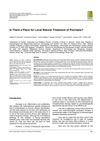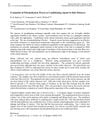2 citations,
January 2016 in “Advanced biomedical research” The hair wax with propolis and Eruca sativa seed oil promotes hair growth effectively.
47 citations,
February 2019 in “Asian Journal of Pharmaceutical and Clinical Research” Jarjeer has potential health benefits and may aid hair growth, but effects on humans are uncertain.
 November 2023 in “International journal of Ayurveda and pharma research”
November 2023 in “International journal of Ayurveda and pharma research” The herbal hair oil effectively promotes hair growth, nourishes the scalp, and prevents dandruff.
 18 citations,
November 2014 in “Journal of Agricultural and Food Chemistry”
18 citations,
November 2014 in “Journal of Agricultural and Food Chemistry” Brazilian propolis was found to speed up hair growth in mice by increasing the growth of skin cells that form hair.
 17 citations,
October 2003 in “Contact dermatitis”
17 citations,
October 2003 in “Contact dermatitis” Glycerin in hand cream can cause allergic skin reactions.
 97 citations,
September 2016 in “Reviews in Endocrine and Metabolic Disorders”
97 citations,
September 2016 in “Reviews in Endocrine and Metabolic Disorders” The sebaceous gland has more roles than just producing sebum and contributing to acne, and new research could lead to better skin disease treatments.
 15 citations,
May 2018 in “Open Access Macedonian Journal of Medical Sciences”
15 citations,
May 2018 in “Open Access Macedonian Journal of Medical Sciences” Propolis and aloe vera ointment effectively treats mild to moderate psoriasis.
 16 citations,
July 2012 in “Current pharmaceutical biotechnology”
16 citations,
July 2012 in “Current pharmaceutical biotechnology” New treatments for skin conditions related to the sebaceous gland are being developed based on current research.
 191 citations,
February 2002 in “Archives of Dermatology”
191 citations,
February 2002 in “Archives of Dermatology” Some herbal therapies may help with skin conditions, but more research is needed to confirm their safety and effectiveness.
 9 citations,
March 2011 in “Oxidative stress and disease”
9 citations,
March 2011 in “Oxidative stress and disease” Some herbal treatments are effective for skin disorders, but more research and regulation are needed.
 May 2024 in “Food bioscience”
May 2024 in “Food bioscience” Wood sterol may help reduce hair loss caused by a high-fat diet.
 8 citations,
September 2004 in “Contact dermatitis”
8 citations,
September 2004 in “Contact dermatitis” Avoiding dyed wigs and clothing improved severe allergic reactions in a woman treated with diphencyprone.
 November 2021 in “Journal of pharmaceutical research international”
November 2021 in “Journal of pharmaceutical research international” Herbal depilatories are safer and cause fewer side effects than chemical ones for hair removal.
 7 citations,
November 2013 in “Pediatrics in Review”
7 citations,
November 2013 in “Pediatrics in Review” Acne is a chronic skin condition not caused by poor hygiene or diet, and it requires long-term treatment and patient education.
 17 citations,
July 2019 in “Scientific reports”
17 citations,
July 2019 in “Scientific reports” Surface and internal treatments can help prevent hair lipid loss during washing.
18 citations,
June 2001 in “Journal of Investigative Dermatology” Adding a specific gene to skin cells can help treat skin disorders like psoriasis.
 2 citations,
January 2015 in “Elsevier eBooks”
2 citations,
January 2015 in “Elsevier eBooks” The document says biodegradable cosmetics and packaging are better for the environment and user experience.
 January 2013 in “Springer eBooks”
January 2013 in “Springer eBooks” Hair care products are important for appearance and self-esteem, and choosing the right ones can help maintain healthy hair.
 48 citations,
July 2001 in “Clinics in Dermatology”
48 citations,
July 2001 in “Clinics in Dermatology” Cosmetics enhance beauty, fix defects, and intimidate enemies, with varying cultural standards and alternative methods.
 December 2021 in “Signal transduction and targeted therapy”
December 2021 in “Signal transduction and targeted therapy” Increasing sebum production might help reduce fat and improve metabolism.
 6 citations,
May 2013 in “PloS one”
6 citations,
May 2013 in “PloS one” The Foxn1(-/-) nude mouse shows disrupted and expanded skin stem cell areas due to high Lhx2 levels.
 105 citations,
January 2010 in “Mediators of Inflammation”
105 citations,
January 2010 in “Mediators of Inflammation” Skin surface lipids are important for skin health and altering them could help prevent aging and treat skin conditions.
 August 2005 in “Microscopy and Microanalysis”
August 2005 in “Microscopy and Microanalysis” Polymethylene wax in hair relaxers makes hair smooth and shiny with less damage.
 6 citations,
February 2018 in “PLOS ONE”
6 citations,
February 2018 in “PLOS ONE” Insect wax, especially its policosanol content, may help hair regrow by changing hair follicle phases and increasing nutrient supply.
 42 citations,
March 2010 in “Endocrinology”
42 citations,
March 2010 in “Endocrinology” Mice with human gene experienced hair loss when treated with DHT.
 76 citations,
January 2007 in “American Journal of Clinical Dermatology”
76 citations,
January 2007 in “American Journal of Clinical Dermatology” Women with PCOS often have skin problems like excessive hair, acne, hair loss, and dark patches, which can be treated with hormonal and non-hormonal therapies.
 24 citations,
September 2014 in “Drug Delivery”
24 citations,
September 2014 in “Drug Delivery” Using microneedles before applying eflornithine cream can make it more effective at stopping hair growth.
 17 citations,
May 2015 in “Nanomedicine: Nanotechnology, Biology and Medicine”
17 citations,
May 2015 in “Nanomedicine: Nanotechnology, Biology and Medicine” Scientists created tiny particles loaded with a hair growth drug, minoxidil, that specifically target hair follicles and skin cells to potentially improve hair growth.
 72 citations,
July 2012 in “Journal of Investigative Dermatology”
72 citations,
July 2012 in “Journal of Investigative Dermatology” Mice lacking a key DNA methylation enzyme in skin cells have a lower chance of activating stem cells necessary for hair growth, leading to progressive hair loss.
 28 citations,
December 2006 in “Clinical lung cancer”
28 citations,
December 2006 in “Clinical lung cancer” Early recognition and management of skin side effects from new cancer therapies can prevent treatment delays.


























